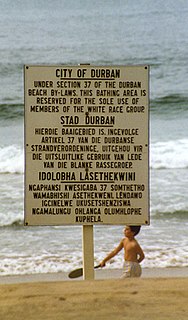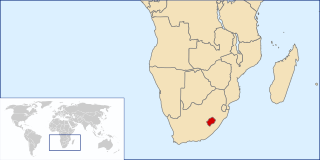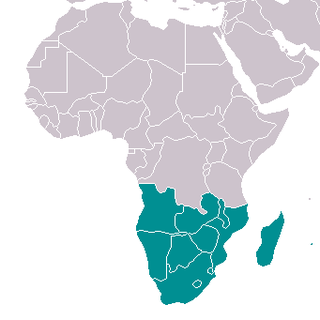
Lesotho, officially the Kingdom of Lesotho, is a country landlocked as an enclave in South Africa. It is situated in the Maloti Mountains and contains the highest mountains in Southern Africa. It has an area of over 30,000 km2 (11,600 sq mi) and has a population of about 2 million.

Donald James Woods, was a South African journalist and anti-apartheid activist. As editor of the Daily Dispatch, he was known for befriending fellow activist Steve Biko, who was killed by police after being detained by the South African government. Woods continued his campaign against apartheid in London, and in 1978 became the first private citizen to address the United Nations Security Council.
The following lists events that happened during 1982 in South Africa.

United Nations Security Council Resolution 402, adopted on December 22, 1976, after hearing from the Minister of Foreign Affairs for Lesotho, the Council expressed concern at South Africa's decision to close the border with Lesotho in many areas in an attempt to pressure the country to recognise the "independence" of the bantustan Transkei. After recalling previous resolutions, the Council praised Lesotho for not recognising Transkei and stated it will organise economic assistance to the country from the organisation itself and other countries to help it overcome the blockade by South Africa.

United Nations Security Council Resolution 402, adopted on May 25, 1977, after recalling Resolution 402 (1976), the Council noted with concern the continued harassment of the people of Lesotho by South Africa in violation of the resolution. It also recognised the burden that had been placed upon Lesotho with regard to its decision not to recognise the "independent" bantustan Transkei by South Africa.

United Nations Security Council Resolution 428, adopted unanimously on May 6, 1978, after hearing representations from the People's Republic of Angola, Zambia and the South West Africa People's Organisation (SWAPO), the Council reminded Member States to refrain from using threats and use of force in their international relations. Reiterating Resolution 387 (1976), the present resolution condemned South Africa for its armed invasion of Angola via South West Africa (Namibia).

United Nations Security Council resolution 473, adopted unanimously on 13 June 1980, after recalling resolutions 392 (1976), 417 (1977), 418 (1977), 454 (1979) and 466 (1980) and letters from the Committee for South Africa, the council expressed its concern and condemned South Africa for the killing of protesters, including schoolchildren, opposed to apartheid.

United Nations Security Council resolution 496, adopted unanimously on 28 May 1982, after examining a report by the Security Council Commission on the Seychelles adopted in Resolution 496 (1981), the Council expressed its concern at the November 1981 coup attempt in the Seychelles by foreign mercenaries, including Mike Hoare, allegedly backed by South Africa, and the subsequent hijacking of an Air India plane.

United Nations Security Council resolution 527, adopted unanimously on 15 December 1982, having heard representations from Moshoeshoe II of Lesotho, the Council condemned, alongside a General Assembly resolution, an attack by South Africa on Lesotho, resulting in damage and the deaths of 40 people.

United Nations Security Council Resolution 535, adopted unanimously on June 29, 1983, after examining the report of the Mission to Lesotho commissioned in Resolution 527 (1982), the Council reaffirmed its opposition to apartheid, commending Lesotho for providing sanctuary to refugees from South Africa.

United Nations Security Council Resolution 545 was adopted on 20 December 1983; after hearing representations from the People's Republic of Angola, the Council recalled resolutions 387 (1976), 428 (1978), 447 (1979), 454 (1979) and 475 (1980), and expressed its concern at the continuing attacks on the country by South Africa through occupied South West Africa.

United Nations Security Council resolution 566, adopted on 19 June 1985, after recalling resolutions 269 (1969), 276 (1970), 301 (1971), 385 (1976), 431 (1978), 432 (1978), 435 (1978), 439 (1978), 532 (1983) and 539 (1983), the Council expressed concern at the tension and instability caused the continued occupation of Namibia by South Africa, noting the apartheid policies implemented in the territory and that the territory was used as a springboard for attacks on other southern African countries.

United Nations Security Council resolution 568, adopted unanimously on 21 June 1985, after hearing representations from Botswana, the Council condemned the Raid on Gaborone by South Africa, expressing its shock and indignation at the loss of life and damage to property and considered the attack as a "gross violation of the country's sovereignty and territorial integrity".

United Nations Security Council resolution 574, adopted unanimously on 7 October 1985, after hearing representations from the People's Republic of Angola, the Council recalled resolutions 387 (1976), 418 (1977), 428 (1978), 447 (1979), 454 (1979), 475 (1980), 545 (1983), 546 (1984), 567 (1985) and 571 (1985), and expressed its concern at the continuing attacks on the country by South Africa through occupied South West Africa.

United Nations Security Council resolution 577, adopted unanimously on 6 December 1985, after reaffirming Resolution 571 (1985), the Council endorsed a report by the Security Council Commission of Investigation, condemning the regime in South Africa for its continued and unprovoked attacks against the People's Republic of Angola through the occupied territory of South West Africa.

United Nations Security Council resolution 581, adopted on 13 February 1986, after hearing representations from Sudan and the front-line states and reaffirming resolutions 567 (1985), 568 (1985), 571 (1985), 572 (1985) and 580 (1985), the Council strongly condemned "racist South Africa" for its recent threats to perpetrate acts of aggression against neighbouring countries in southern Africa.

Lesotho–Russia relations are the bilateral relations between Russia and Lesotho.
The Raid on Gaborone took place on 14 June 1985 when South African Defence Force troops, under the order of General Constand Viljoen, crossed into Botswana violating International Law and attacked South African émigrés living in exile in Gaborone. The raid, the fifth South African attack on a neighbouring country since 1981, killed 12 people including women and children; only five of the victims were actual members of the African National Congress (ANC), at the time the main opposition group against the National Party white supremacist minority regime.

Human rights in Lesotho, a nation of 2,067,000 people completely surrounded by South Africa, is a contentious issue. In its 2012 Freedom in the World report, Freedom House declared the country "Partly Free". According to the United States Bureau of Democracy, Human Rights and Labor, which produces annual human rights reports on the country, the most pressing human rights issues are the use of torture, poor prison conditions, and the abuse of women and children.

On 30 August 2014, Lesotho's Prime Minister Tom Thabane alleged that a coup d'état had been launched against him. This followed a previous allegation which caused him to suspend parliament over possible extra-constitutional manoeuvres. It also followed pressure from South Africa to maintain the democratic process. The next day, Deputy Prime Minister Mothetjoa Metsing assumed responsibility for running the government. An early election was held in February 2015 as a result of South African-led Southern African Development Community (SADC) mediation, giving power to the opposition.















